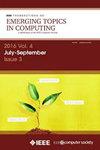近似编码计算:走向快速、私有和安全的分布式机器学习
IF 5.4
2区 计算机科学
Q1 COMPUTER SCIENCE, INFORMATION SYSTEMS
IEEE Transactions on Emerging Topics in Computing
Pub Date : 2025-04-24
DOI:10.1109/TETC.2025.3562192
引用次数: 0
摘要
在大规模的分布式机器学习系统中,编码计算由于能够有效地缓解掉队者的影响而受到了广泛的关注。然而,一些新出现的问题极大地限制了编码分布式系统的性能。首先,相互串通结果的串通员工的存在导致了严重的隐私泄露问题。其次,考虑分布式计算系统或编码分布式机器学习系统数据传输安全问题的现有工作很少。第三,需要等待的结果数量随着解码功能的程度而增加。本文设计了一种安全、私有的近似编码分布式计算(SPACDC)方案,同时解决了上述问题。我们的SPACDC方案采用了一种新的基于椭圆曲线加密的加密算法,保证了数据在传输过程中的安全性。特别是,SPACDC方案没有对需要等待的最小结果数施加严格的限制。进行了广泛的性能分析,以证明我们的SPACDC方案的有效性。在此基础上,提出了一种安全、私有的分布式学习算法,为训练数据提供信息论的隐私保护。我们的实验表明,基于spacdc的深度学习算法比基线方法实现了显着的加速。本文章由计算机程序翻译,如有差异,请以英文原文为准。
Approximated Coded Computing: Towards Fast, Private and Secure Distributed Machine Learning
In a large-scale distributed machine learning system, coded computing has attracted wide-spread attention since it can effectively alleviate the impact of stragglers. However, several emerging problems greatly limit the performance of coded distributed systems. First, an existence of colluding workers who collude results with each other leads to serious privacy leakage issues. Second, there are few existing works considering security issues in data transmission of distributed computing systems/or coded distributed machine learning systems. Third, the number of required results for which need to wait increases with the degree of decoding functions. In this article, we design a secure and private approximated coded distributed computing (SPACDC) scheme that deals with the above-mentioned problems simultaneously. Our SPACDC scheme guarantees data security during the transmission process using a new encryption algorithm based on elliptic curve cryptography. Especially, the SPACDC scheme does not impose strict constraints on the minimum number of results required to be waited for. An extensive performance analysis is conducted to demonstrate the effectiveness of our SPACDC scheme. Furthermore, we present a secure and private distributed learning algorithm based on the SPACDC scheme, which can provide information-theoretic privacy protection for training data. Our experiments show that the SPACDC-based deep learning algorithm achieves a significant speedup over the baseline approaches.
求助全文
通过发布文献求助,成功后即可免费获取论文全文。
去求助
来源期刊

IEEE Transactions on Emerging Topics in Computing
Computer Science-Computer Science (miscellaneous)
CiteScore
12.10
自引率
5.10%
发文量
113
期刊介绍:
IEEE Transactions on Emerging Topics in Computing publishes papers on emerging aspects of computer science, computing technology, and computing applications not currently covered by other IEEE Computer Society Transactions. Some examples of emerging topics in computing include: IT for Green, Synthetic and organic computing structures and systems, Advanced analytics, Social/occupational computing, Location-based/client computer systems, Morphic computer design, Electronic game systems, & Health-care IT.
 求助内容:
求助内容: 应助结果提醒方式:
应助结果提醒方式:


